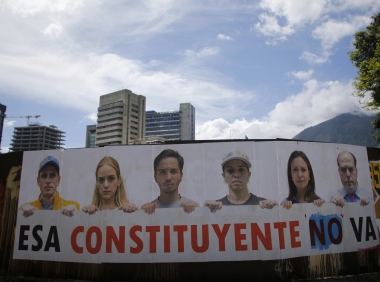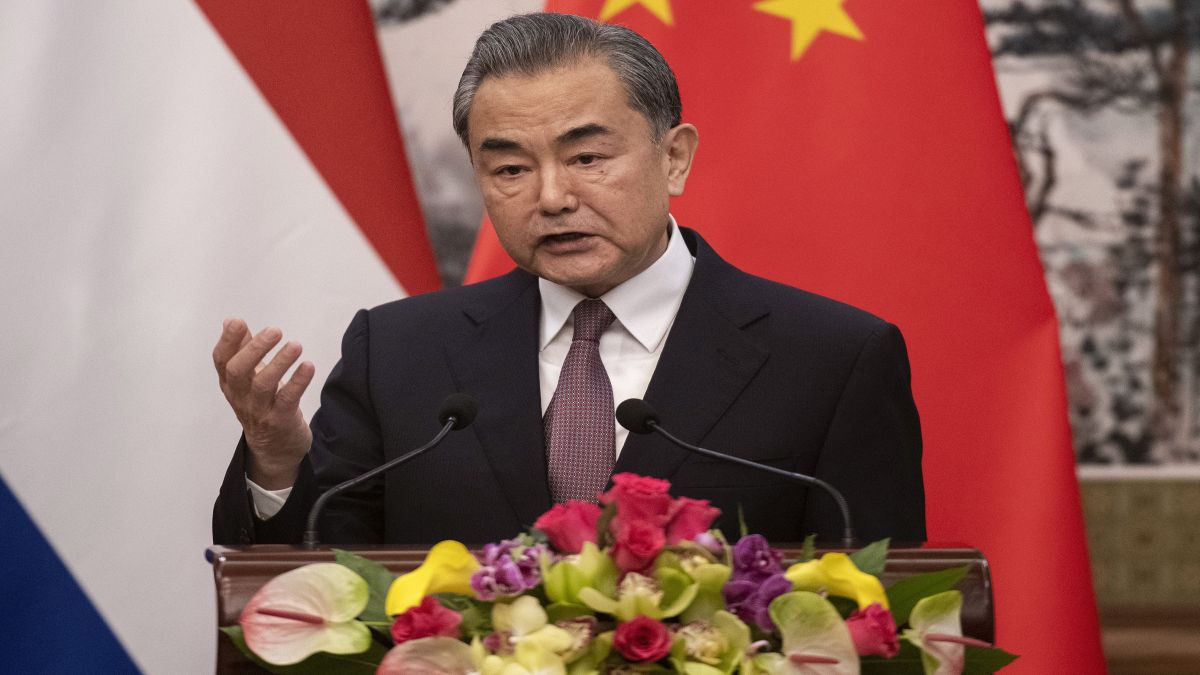Venezuelan president Nicolas Maduro has provoked international criticism and enraged his political opponents by pushing for a special Assembly to rewrite the troubled South American nation’s constitution. Sunday’s election of delegates to the Assembly comes after nearly four months of political upheaval that have resulted in more than 100 deaths and left thousands injured and detained. The new Assembly will be convened within 72 hours of the election and will function with virtually unlimited powers. Maduro and his closest allies have vowed to use the Assembly to jail key opposition leaders, remove the nation’s outspoken chief prosecutor from her post and strip opposition legislators of their constitutional immunity. Many in the opposition fear it will mark the end of democracy in Venezuela. [caption id=“attachment_3875455” align=“alignleft” width=“380”] A protest sign in Venezuela which says “That Constituent Assembly will not pass”. AP[/caption] Maduro’s mentor, the late President Hugo Chavez, similarly called for a constitution rewrite shortly after taking office in 1999, but unlike Maduro he held a referendum first to get Venezuelans’ blessing. Even some “Chavistas” have rejected the drive to change the constitution, which has further polarised an already deeply divided country. How will delegates be chosen? Venezuela’s government-stacked National Electoral Council created an unorthodox voting system that opponents say heavily favours the ruling party. A total of 364 delegates will be selected according to geography: In each of Venezuela’s 23 states, one delegate will be allotted per municipality while state capitals get two. But some of the most populated states have relatively few municipalities, while some smaller ones have many. That means a state like Miranda, population nearly 3 million, will get four fewer delegates than Falcon, which is home to about 1 million people. Critics say that unfairly favours rural areas where Maduro is more popular over opposition-friendly cities such as Caracas, the capital. An additional 173 delegates will come from various categories of social groups including labourers, students, farmers and fishermen. Eight slots are reserved for indigenous communities. How the government determined who qualifies in each category has not been disclosed, but all of those sectors traditionally have strong ties to Chavez and Maduro’s leftist political movement. The opposition is boycotting the election, so the majority of candidates represent the ruling socialist party. What changes has the government vowed to make? Maduro has characterised the Constituent Assembly as a lofty solution for Venezuela’s long list of political and economic woes — and a concrete way of silencing his most vocal foes. In an address on state-run television Saturday, Maduro said he wants the Assembly to strip legislators in the opposition-controlled National Assembly of their immunity and see at least one of them jailed — Freddy Guevara, the legislature’s first vice president and one of the highest-profile organisers of protests against the government. “This little Hitler has his cell guaranteed!” Maduro shouted, using his frequent nickname for Guevara. On Wednesday, first lady Cilia Flores, who Maduro calls Venezuela’s “First Combatant,” said the Assembly will create a peace and justice commission that will ensure those responsible for the current political upheaval “pay and learn their lesson.” Diosdado Cabello, first vice president of Venezuela’s socialist party, has said the office of Venezuela’s chief prosecutor, who has recently become one of Maduro’s most outspoken critics, will be “turned upside down.” The Assembly is certain to continue the socialist policies first installed by Chavez. Aside from rewriting the constitution, the National Constituent Assembly could function as a sort of super-body that assumes the powers of the National Assembly, the only government branch not controlled by Maduro. What do the Venezuelans think of the plan? A June survey by Venezuelan polling firm Datanalisis said just 23 percent favour the constituent Assembly. Only 19 percent said they thought a new constitution would “guarantee the peace of stability of the country,” as Maduro has asserted. Nearly half said they believe the purpose of the Assembly is to ensure Maduro stays in power. Earlier this month, more than 7.5 million Venezuelans voted in an unofficial opposition referendum rejecting the constitution rewrite. But those numbers do not mean Venezuelans are unlikely to show up at polling stations Sunday. Aside from government loyalists, groups of state workers and government organisation are being mobilised and pressured to cast ballots. Luis Vicente Leon, president of Datanalsis, said that because the government has access to data showing who does and does not vote, many people are likely to feel obligated to participate or risk losing their jobs in a country with severe food shortages and triple-digit inflation. “If this was a free election, without pressure, about a third of the number that participated in the popular consult would vote,” he said, referring to the opposition referendum. What is at stake for the government? Its survival. Recent breaks with Maduro by high-level officials including longtime government loyalist Luisa Ortega Diaz, the chief prosecutor, and a string of former Cabinet ministers under Chavez indicate discord already exists within the ruling party. Radical changes in the 1999 constitution, which was crafted by Chavez and considered one of his crowning legacies, could cause even greater division, said John Magdaleno, director of the Caracas-based consulting firm POLITY. “It’s not just a matter of whether the constituent Assembly is put in place or not,” he said. “It’s what impact its creation could have.” Foreign governments including the United States have threatened to further isolate the government. President Donald Trump has said the US will take “strong and swift economic actions” if the constituent Assembly election proceeds. That could potentially include reducing US imports of Venezuelan oil, a move that could cripple the economy. The government relies heavily on the US as a source of hard currency, because its oil exports to other major trade partners like China are paying off debts. How is the Opposition likely to respond? The conflict between the government and the opposition won’t end Sunday. A coalition of Venezuelan opposition parties proposed but then appeared to back away from its call to form an alternative “government of national unity.” Nonetheless, a recent move by the opposition-controlled National Assembly to appoint 33 magistrates to replace the government-stacked Supreme Court again raised the spectre of a potential parallel government. “The question is whether that parallel government could govern,” said Leon, the pollster. For now, any alternative officials named by the opposition remain purely symbolic. Three of the 33 opposition-appointed magistrates have been detained, while the others have been threatened with arrest and are unable to fill their posts. A prolonged conflict appears increasingly likely. Third parties have sought unsuccessfully to forge negotiations between the administration and its foes. Guevara told Venezuelans Saturday to prepare for difficult days ahead. “After Sunday, it will not be easy for us,” he said. The next presidential election is now set for 2018, but the constituent Assembly could change that and further anger the opposition. “We’re talking about a conflict that will last until there are elections,” said Benigno Alarcon, director of the Center of for Political Students at Andres Bello Catholic University in Caracas.
An explainer on what Nicolas Maduro is trying to do in Venezuela and how it will affect the South American nation’s democracy.
Advertisement
End of Article


)

)
)
)
)
)
)
)
)



